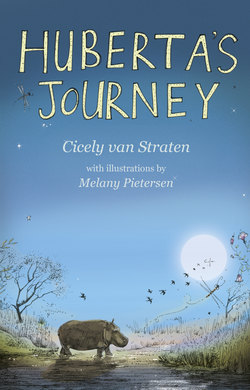Читать книгу Huberta's Journey - Cicely van Straten - Страница 10
На сайте Литреса книга снята с продажи.
ОглавлениеSix
The calf born to Novikela had grown with the year’s rounding. Now she nudged the udders only in play and grazed beside the cow, learning to select the grasses loved by the herd.
The calf’s muzzle was larger, her eye ridges more pronounced. Her hide had darkened to grey-black with rosy-gold tints round her mouth, neck and underbelly. She often submerged to run the river bed paths on her own and spent more time with other calves.
After the death of Mzamuli the ancient harmony of the river valley was restored. Obedient to the slow, sure rhythms of the bush, the herd feared no living thing. The only creature they had to fear was man. And as yet they knew little of humankind.
From time immemorial hippo had haunted the rivers of KwaZulu-Natal. For millennia they had grazed lush hillsides and lazed in warm brown waters. They had been hunted from time to time, for meat, fat and hide, ever since man had lived beside them.
In the time of Shaka, white men had come and ravaged the herds, killing thousands for ivory and skins. Then they had gone away and the hippo had known peace again.
But now, in the late 1920s, white men came again. Great sugar estates were spreading north, pushing into the territory of the wild creatures. The bush was hacked and burned, big trees were dragged from the red earth. Hills that had once rippled with grass, valleys that had foamed with forest were becoming a uniform sea of sugar cane.
On a night of the new moon Sihambi and his cows stood on the crest of a hill. They were puzzled. A warm breeze from the south brought disturbing scents – of ploughed earth, wood smoke and a sour smell: the smell of man.
All these they had met before, from a distance. But mingled with these was a new fragrance.
Sihambi raised his head and his nostrils drew in a scent as compelling as honey to the badger – the smell of sugar cane. He plunged downhill and led his cows and claves to a wide fertile valley where the rich loam had been planted with rows of cane.
With a soft rumble of anticipation they entered the field. All night they cropped the sweet cane until dawn urged them back to the river. Behind them they left a ravaged plantation spattered with huge, four-toed prints.
The next night they returned to the cane fields. And the night after. On the fourth night the sour smell was strong in the air. Sihambi paused, uneasy. But the pull of the sweet cane was too strong and again he led his group into the valley to graze.
Suddenly the smell of man wafted strong on the breeze. Sihambi raised his head. Bobbing lights were moving towards them. He grunted an alarm and swung to retreat. Sharp cracking noises came out of the darkness. Something bit deep into his shoulder. With a bellow of pain he charged up the hill, followed by his cows and calves.
The sharp sounds came again and again. Novikela, careful to keep her calf at her side, was trotting behind the others when another crack sounded. Her legs gave under her. With the next crack she received a blow on the head.
Men came running, shouting. Novikela tried to rise but could not. Her calf was trotting around her, nuzzling her, trying to urge her to her feet.
Out of the darkness an eye of light was approaching.
“We got one!”
“Careful, sir. The imvubu bites deep.”
“Isn’t that a calf with her?”
“Watch for the big one. Who says it’s dead?”
“I’ll put another bullet in it for good measure.”
And again the rifle cracked. The old cow jerked and lay still. Sensing death, the calf panicked and slithered frantically through the mud, away from the men. A shot rang out and a bullet whined past her.
Snorting in terror, the calf dashed uphill until she found Sihambi’s scent and followed it to the hilltop. He and his cows were there, dark against the dawn sky, waiting for her and Novikela.
The trembling calf pressed against Nombili, who calmed her anguish with low grunts. The others stood facing south, still watching for Novikela. Once, twice Sihambi grunted into the silence and waited for an answering “hom-hom” from his oldest cow.
But only the quavering call of a nightjar came back. As the sun rose, the hippos turned and went silently back to the river.
For days the calf trotted around the sandbank, waiting for her mother to come back. But she never returned. Gradually the calf took to following Nombili and pressed close to her when they left to graze at twilight. They did not go to the cane fields again.
But, the people from the sugar plantations had declared war on the hippo herd. One day men appeared at the river’s edge and shot into the nursery. Two cows and a calf died. Their carcasses bloated on the sandbank, causing a foul stench and an intrusion of crocodiles and vultures.
Again men came and shot. And a month later, again. This time the nursery was choked with carcasses. The herd of twenty-three was reduced to eleven: two bulls – one was Nosibanzi, old and cunning – four cows and five calves.
That day they sheltered in a deep pool, under the shadow of an umbrella thorn. Their old haven was no longer a refuge but a place of terror.
That night they disappeared from the river valley for ever.
